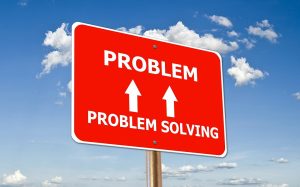In today’s rapidly evolving business landscape, conflict management skills have emerged as critical competencies for every professional. The increasing complexity of our work environments not only presents a multitude of potential solutions but also gives rise to more frequent and nuanced conflicts. Recognizing and developing these skills is crucial, and tools like the HIGH5 strengths assessment can play a pivotal role in this process. By identifying your innate strengths, you can leverage them to navigate conflicts more effectively, turning potential challenges into opportunities for growth and innovation.
Resolving them is essential to every successful company, and it’s nearly impossible to resolve them without having conflict management skills.
In this article, we’re going to present some of the most useful conflict management skills, recommend how everyone can improve them, and present 7 steps of conflict resolution that can help to effectively resolve every dispute.
What are Conflict Management Skills? Definition & Meaning
Conflict management skills are a set of abilities that enable you to effectively navigate and resolve potential conflicts. These skills are often rooted in your natural strengths, which can be identified through assessments like the HIGH5 strengths test. By understanding your innate talents in areas such as communication, empathy, or problem-solving, you can leverage these strengths to manage conflicts more effectively. Without recognizing and utilizing these skills, it becomes challenging to reach a satisfactory resolution in disputes.
Conflict management skills not only help to solve a negative conflict but also to minimize the negative consequences of each dispute, by achieving the best possible solution that satisfies everyone involved. These skills are a must-have for everyone involved in the business world and can help you to stand out from the rest.
Pro Tip From HIGH5
Identify your conflict management strengths using the HIGH5 test. Once you know your top strengths, consciously apply them in conflict situations. For example, if ‘Empathizer’ is one of your strengths, use it to better understand others’ perspectives during disagreements.
Conflict Resolution Strategies
Conflict management skills are a set of skills that allows you to effectively resolve potential conflict. Without utilizing these skills, it becomes virtually impossible to reach an end of a dispute.
Conflict management skills not only help to solve a negative conflict but also to minimize the negative consequences of each dispute, by achieving the best possible solution that satisfies everyone involved. These skills are a must-have for everyone involved in the business world and can help you to stand out from the rest.
- Avoiding – It’s when a conflict discussion is avoided with hopes that time and space will allow people to get a new perspective and solve it later on.
- Accommodating – This style aims to give another party everything they want in order to solve a conflict as quickly as possible.
- Compromising – This strategy tries to find the mid-way point that will somewhat satisfy both parties.
- Competing – It’s when one party tries to satisfy its own needs without any regard to the needs of another party.
- Collaborating – This style tries to find the long-term solution possible that will fully satisfy the needs of both parties. However, it’s very time-consuming.
10 Examples of Conflict Management Skills & Techniques
- Effective communication
- Active listening
- Problem-solving
- Level-headedness
- Positive attitude
- Empathy
- Give time and space
- Follow up
- Avoid ad hominem
- Be willing to compromise
Effective communication
Conflicts are already difficult to deal with as they are. What makes them even more difficult is poor communication. Some conflicts arise only because of miscommunication.
If you always try your best to speak in a clear and precise manner, another party will know exactly where you stand and conflicts will become way easier to solve. Additionally, try to use a friendly tone and avoid raising your voice, it will put another person at ease.
Active listening
Even if you’re communicating effectively, another person might not be trying his best to avoid miscommunication. That’s why it’s very important to listen actively and try your best to understand what another person is trying to communicate.
A single misheard word can change the entire direction of a conflict for the worse, and you definitely want to avoid that. When you’re in a conflict, pay 100% of your attention to what another person is saying.
Problem-solving
There’s no end to a conflict if there isn’t a viable creative solution. Sometimes all parties involved get stuck and start believing that there’s no such viable solution and that the conflict is impossible to solve.
However, most conflicts can be solved, and problem-solving skills can greatly help you to find the solution. Even presenting baby steps towards a solution can reduce the tension and make the rest of the conflict go more smoothly.
Level-headedness
There’s nothing worse than losing your temper during a conflict or an argument. Even if you’re right, lashing out at someone is admitting defeat. To avoid that, try to be level-headed and always maintain your composure. Breathe, don’t hurry, and allow yourself to stop and think, even if it creates a moment of silence.
Positive Attitude
People are more likely to collaborate with people who are optimistic and positive. No one wants to deal with that guy, and everyone knows that guy in the office.
Simply smiling and showing a positive attitude can make conflicts less complex and easier to solve. If everyone is working as a team and trying to achieve a common goal, most conflicts will become easy to resolve.
Empathy
It’s comfortable to focus on your own needs without even trying to understand the perspective of another party. However, practicing empathy and trying to place yourself in their shoes can make you understand the very core of a conflict and solve it with ease.
Give Time and Space
Conflicts often become tense. If everyone butt heads it becomes extremely difficult to come up with a solution. That’s why giving limited time and space to another party is crucial.
It allows everyone to cool down and begin managing a conflict with a new set of eyes. Such a technique is very effective if the conflict is ongoing for a while and the solution is nowhere to be seen.
Follow Up
Solving a conflict is only part of the job. After it’s done, it’s very important to follow up with another party and talk about how they’re feeling about the resolution.
It builds a foundation for a long-term partnership, which will make other conflicts down the line easier to solve. If you’re just trying to win a conflict without any regard to another party, it might cause you problems in the future.
Avoid Ad Hominem
It’s very easy to attack the person instead of their position. However, that’s one of the biggest no-nos in the business world. Such attacks are called ad hominem, You’ll not only look immature but also make it more difficult to solve the conflict.
Focusing on another person instead of the issue might “win” you an argument, but it definitely won’t solve the conflict.
Be Willing to Compromise
Conflicts are difficult not without a reason. Everyone wants to get what they want, and if one party gets everything it demands, it usually means that another party is left empty-handed. That’s where compromises come in.
You can try to find a midway point that would somewhat satisfy the needs of both parties. While it means that neither party will be fully happy with such an outcome, some conflicts simply cannot be solved in any other manner.
How to Identify & Improve Conflict Management Skills
While self-reflection on past conflicts is valuable, a more comprehensive approach to identifying conflict management skills involves using scientifically-backed assessment tools. The HIGH5 strengths test offers a systematic way to uncover your natural talents, including those crucial for effective conflict management. By understanding your unique strength profile, you can pinpoint which conflict resolution strategies align best with your innate abilities. This self-awareness not only helps in identifying your skills but also provides a foundation for targeted improvement.
For example, you can find that a conflict in the past got resolved only when you began actively listening to another party. Using the same technique, you can improve your conflict management process.
If a conflict in the past went astray, ask yourself why it did so. You’ll soon realize what skill you were lacking. Then when you come upon a similar situation in a future conflict, you can focus on that skill and try your best to utilize it properly to not repeat the same mistake again.
If your company doesn’t offer training on conflict management strategy, experience and self-reflection are the best methods to improve and develop them yourself.
Pro Tip From HIGH5
After taking the HIGH5 test, create a ‘Conflict Resolution Toolkit’ based on your top strengths. For each strength, list specific ways it can be applied in conflict situations. Regularly update this toolkit as you gain more experience in using your strengths effectively.
What are the 7 Steps in Conflict Resolution?
Agree To Talk and Establish Boundaries
To solve an intense conflict, first and foremost all parties involved have to agree to talk. Even if one party rejects to meet up and talk about the issue, the solution will never appear.
During the first meeting, it’s important to establish boundaries of the following discussion and conflict resolution. All parties must agree on common rules like no interrupting, taking turns, and so on.
Take Turns in Expressing Feelings and Thoughts
When boundaries are established, each party should take turns in expressing their own perspective on the issue, including feelings and thoughts. It will put all parties on the same level from which the eventual solution will arise.
Find the Core of the Conflict
After everyone’s perspective on the issue is clear, try to find the very core of the conflict. Sometimes after all parties declare their point of view, the conflict disappears, because it was born out of miscommunication. In other cases, finding the main problem of disagreement is a necessary step to take.
Share Possible Solutions
Now when the main problem is identified, each party can take turns in proposing their own solution. At first, these solutions will seem unacceptable to other parties, because each party usually wants to satisfy their own needs to the maximum. However, sharing possible solutions will help to find the perfect solution for everyone involved.
Find the Best Solution
Finding the best solution is difficult because in most cases it means that one or more parties will have to sacrifice some of their needs to achieve it. It’s called compromise, and in most cases, it’s essential for finding the best solution.
Voice Out the Solution
When all parties agree on the best solution, it must be voiced out clearly and accurately to avoid future disagreements. Formulating a concrete solution and then voicing it out will make it real and set in stone.
Follow Up
After a solution is voiced out and fulfilled, a follow-up with each party involved is a must. During the follow-ups, all parties can discuss how they’re feeling about the accepted solution and maybe find ways to improve it.
Why Employers Value Conflict Management Skills
While companies aim to minimize destructive conflicts, it’s crucial to recognize that not all conflicts are detrimental. In fact, when managed effectively, conflicts can drive innovation and improve team dynamics. This is where strong conflict management skills become invaluable. By utilizing tools like the HIGH5 strengths assessment, both employers and employees can identify and leverage their natural talents in conflict resolution. This strengths-based approach not only helps in addressing conflicts constructively but also contributes to a positive company culture where diverse perspectives are valued and effectively integrated.
That’s why nearly all employers value effective conflict management skills. If you’re capable of solving every conflict without much trouble, it means that you’ll have more time to do your actual work.
Additionally, if every single person in the company possesses such skills, it leads to a great company culture, where everyone is working as a team to achieve a common goal. It will pave the way for improvement and improved results.
Pro Tip From HIGH5
As a manager, consider having your team take the HIGH5 test. Use the results to create a ‘Team Conflict Resolution Map’ that outlines each member’s strengths in managing different types of conflicts. This can help in assigning roles during conflict resolution processes and in fostering a strengths-based team culture.
Conflict Resolution in Relationships – List of Benefits
Conflicts are prominent not only at workplaces but also in personal relationships. Obviously, it’s one of the main reasons why people break up or stop being friends.
Conflict strategy in personal life is extremely important for a healthy lifestyle because without it most of your relationships will end on a sour note. To effectively manage conflicts in daily life, you have to use most of the skills that we’ve mentioned in the article.
It will bring numerous benefits, such as:
- Strengthens Relationships
- Builds New Relationships
- Increases Commitment
- Reduces Stress and Anxiety
How to Highlight Conflict Management Skills in Resume
Conflict management skills are essential in every workplace, yet they might not be the first thing employers look for in a resume. This is why it’s crucial to highlight these skills effectively. One powerful way to do this is by incorporating insights from your HIGH5 strengths assessment. By identifying and articulating your top strengths related to conflict management, such as ‘Strategist’ or ‘Peace Keeper’, you provide concrete evidence of your conflict resolution capabilities. This strengths-based approach not only brings attention to your skills but also demonstrates self-awareness and a commitment to personal development – qualities highly valued by employers.
The best way to do so is to put your conflict management skills under the “skills” section of your resume. A hiring manager or recruiter will notice them and will be pleasantly surprised that you’ve included them in your resume.
It’s especially great if you’re applying for a managerial or human resources job, because despite being essential for the job. most applicants don’t include these skills in their resumes.
Pro Tip From HIGH5
In your resume or cover letter, include a brief statement about how you’ve applied your top HIGH5 strengths in resolving a specific workplace conflict. This real-world example will make your conflict management skills more tangible and memorable to potential employers.
How to Question and Answer About Conflict Management Skills
If you’ve included conflict management skills in your resume, you must know how to answer the possible question about them during a job interview. If you come unprepared to answer questions about your skills, chances are you won’t get a second call.
Regardless of the question, always try to maintain eye contact when talking. Besides being respectful, it will also signal that you carry a necessary level of confidence for the job.
Additionally, maintain open body language, and don’t cross your arms or legs. Finally, communicate effectively by speaking clearly. If you’ve included conflict management skills in your resume, it’s not uncommon to be asked about a previous conflict where you had to use some of those skills.
That’s why it’s best to think about some of the conflicts from your past before an interview and have them ready in case you’re asked about it. You definitely don’t want to fumble your words and think of something on the spot, so be prepared.
Conflict Management Skills FAQs
How can leaders manage conflict?
Leaders need to have a clear conflict resolution plan. First, the leader should speak to both parties involved. Tru to identify the root cause of the problem (it may stem from something deeper than what first meets the eye).
Set boundaries between the two parties and consider separating them. Finally, set a goal for conflict resolution. Also add consequences for individuals who repeatedly start conflicts.
What are conflict management skills?
Conflict management skills are the traits and abilities that allow individuals to avoid conflicts and deal with them effectively once they occur.
These skills could help the individual better connect with employees, communicate better, have empathy for the other party, actively listen to the other individual, compromise and collaborate, remain calm under pressure so the conflict does not escalate, and so on.
What are the 6 conflict resolution skills?
While there are many skills that would aid you in resolving conflicts, there are 6 key skills that are truly essential in conflict resolution.
These are: being able to clearly articulate your boundaries and expectations (communication), turning conflict into an opportunity for growth (adaptability and positivity), relating your goals with the other individual’s goals (collaboration), focusing on long-term goals, and being open to new solutions.






